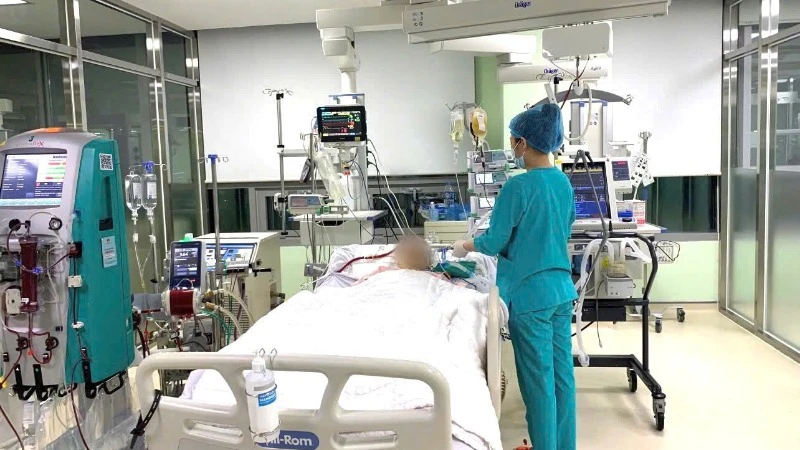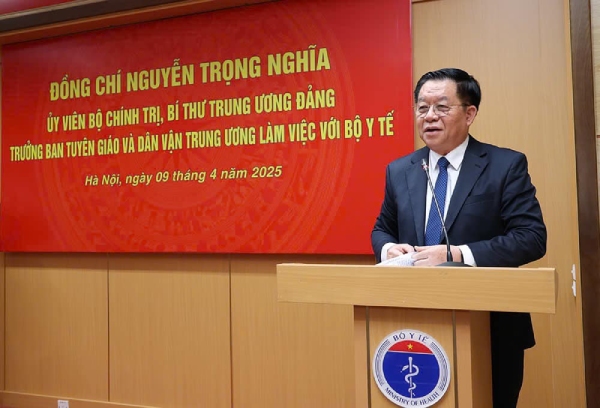"Hungry bone" syndrome occurs when low blood calcium persists, often after parathyroid or thyroid surgery.
This article was professionally consulted by Dr. Nguyen Thi Thanh Truc, Department of Endocrinology - Diabetes, Tam Anh General Hospital, Ho Chi Minh City.
Hungry bone syndrome (HBS) can occur in patients with thyrotoxicosis and prostate cancer with bone metastases. The disease causes low blood calcium, phosphorus, and magnesium levels.
People with primary hyperparathyroidism have a 4-13% chance of developing "hungry bone syndrome". This rate increases to 20-70% in people with secondary hyperparathyroidism. Patients after thyroid surgery have a 27% chance of developing this syndrome, and people with Graves' disease have the highest risk, about 47%.
Reason
Parathyroid hormone (Polypeptide - PTH) plays a role in controlling the levels of calcium, phosphorus, and vitamin D in the blood and bones. When blood calcium is low, the parathyroid gland secretes the hormone PTH, which stimulates the release of calcium from the bones into the blood. Hyperparathyroidism occurs when blood PTH levels are high.
After parathyroid surgery to treat hyperparathyroidism, PTH levels often drop suddenly. During thyroid surgery, if the parathyroid gland is damaged, PTH levels may drop, leading to decreased bone resorption and increased new bone formation. This results in a calcium deficiency in the bones, hence the name "hungry bone" syndrome. Blood calcium levels drop to increase calcium use for bone formation.

Patients after thyroid surgery should see a doctor to monitor bone density, blood calcium levels and parathyroid hormone. Photo: Freepik
Symptom
Because of the pathogenesis, "hungry bones" syndrome has symptoms similar to hypocalcemia. Symptoms include muscle cramps or spasms, muscle weakness, bone pain, fatigue, confusion, irritability or restlessness, and tingling of the lips, tongue, fingers, or feet. Severe hypocalcemia can cause spasms of the throat muscles leading to difficulty breathing (laryngospasm), muscle stiffness (tetany), and epileptic seizures.
Diagnosis and treatment
Blood calcium tests help diagnose the disease. A blood calcium level below 8.4 mg/dL for more than 4 days can indicate that the patient has "hungry bone syndrome".
Patients may have to do other tests including blood magnesium, phosphorus, vitamin D, electrocardiogram, bone X-ray... to assess the impact of the disease on health.
The goal of treatment is to return blood calcium levels to normal. Treatment options include intravenous calcium, oral calcium supplements, vitamin D, and magnesium supplements.
The disease has a high success rate of treatment, some cases lasting from several months to several years. If not detected and treated early, "hungry bone" syndrome can easily leave complications such as convulsions, cramps, osteoporosis, bone fractures, impaired motor function, heart rhythm disorders...
Dr. Truc recommends that patients after parathyroid or thyroid surgery should have their bone density, blood calcium, phosphorus, vitamin D and parathyroid hormone levels carefully checked. Supplement vitamin D and calcium before surgery. After surgery, patients need to continue to monitor the above indicators and notify the doctor if there are any abnormalities.
Dinh Tien
| Readers ask questions about endocrine diseases - diabetes here for doctors to answer |
Source link




![[Photo] Opening of the 11th Conference of the 13th Party Central Committee](https://vstatic.vietnam.vn/vietnam/resource/IMAGE/2025/4/10/f9e717b67de343d7b687cb419c0829a2)
![[Photo] April Festival in Can Tho City](https://vstatic.vietnam.vn/vietnam/resource/IMAGE/2025/4/10/bf5ae82870e648fabfbcc93a25b481ea)

![[Photo] Prime Minister Pham Minh Chinh commends forces supporting Myanmar in overcoming earthquake consequences](https://vstatic.vietnam.vn/vietnam/resource/IMAGE/2025/4/10/e844656d18bd433f913182fbc2f35ec2)






















![[Photo] Reliving the heroic memories of the nation in the program "Hanoi - Will and belief in victory"](https://vstatic.vietnam.vn/vietnam/resource/IMAGE/2025/4/10/19ce7bfadf0a4a9d8e892f36f288e221)































































Comment (0)